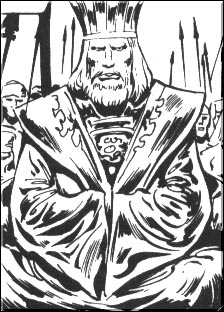
Shemitish

"They sighted the coast of Shem -- long rolling meadowlands with the white crowns of the towers of cities in the distance, and horsemen with blue-black beards and hooked noses, who sat their steeds along the shore and eyed the galley with suspicion. She did not put in; there was scant profit in trade with the sons of Shem." -- Robert E. Howard: "Queen of the Black Coast"


In the vast land of Shem, despotic kings rule stately city-states in luxurious, sensual splendor within walled palaces in the west, and lean nomads in camel's hair tents rule the arid desert sands to the east.
The coastline has few harbors, thus overland trade is the true lifeblood of the nation. Crisscrossing the land in all directions are the famed caravan routes, ever-traveled by camel trains.
The people of Shem are generally of medium height, broad shouldered and solid, with hooked noses, dark eyes, and blue-black hair. The men sport thick, curled beards and are famed as archers, selling their skill at bow to many a Hyborian army. Primarily these people are herdsmen and farmers. An industrious, clever people, they manufacture textiles and pottery.
The Eastern Desert is the home of the Zuagir nomads, aggressive raiders whose desert-bred horses are the finest in the world. These nomads are not aligned with any of the city-states. They raid Shemitish, Zamoran and Turanian caravans and steadings for their food, weapons and wealth. Much of the mercenary work available in eastern Shem is due to fear of the Zuagir, and the kings of Turan have repeatedly sent forces into the desert to drive the Zuagir away.
All Shemites, west and east, worship the female Earth Mother Goddesses whom they deem responsible for their lands, their herds, and their families. Chief of these are Ashtoreth, Derketo, and Ishtar. Pteor, Adonis, and Bel of Shumir are popular male gods. Though the rival city-states are polytheistic, each has its own patron deity.
